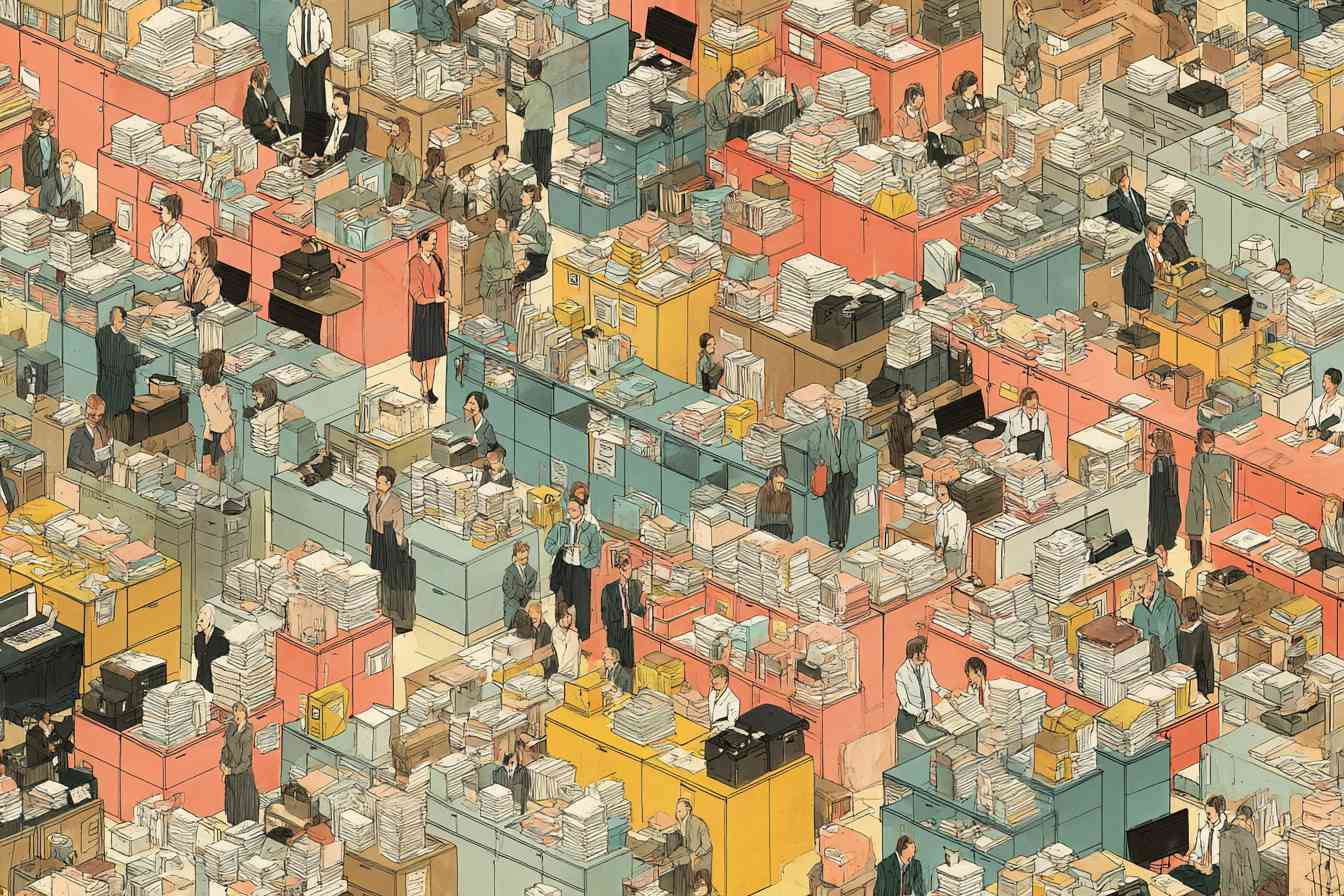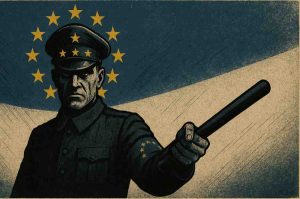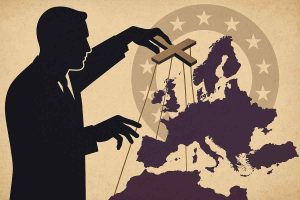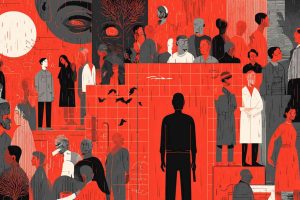The civil servant state and the detoriation of freedom and democracy

The expanding government and its impact
In modern Western societies, the size of the government apparatus has grown exponentially over recent decades. Where governments once focused on maintaining order, collecting taxes, and facilitating infrastructure, we now see a complex network of ministries, agencies, commissions, regulators, advisory boards, and semi-public institutions. This growth is often presented as necessary to ensure safety, the environment, health, and justice. In reality, it creates a population increasingly dependent on a system that sustains and expands itself regardless of actual societal value (Bureaucracy, Ludwig von Mises).
Every expansion of the government is accompanied by an increase in civil servants, managers, policy officers, and administrative staff. These roles rarely contribute directly to society; they produce no goods, deliver no services that drive economic growth, and rarely foster innovation. Instead, they oversee, process paperwork, produce reports, and maintain statistics. The result is a societal imbalance: an ever-growing segment lives off the work of a relatively small, productive class.
The economic burden of the civil service
The costs of a growing civil service are entirely borne by productive citizens. Entrepreneurs, self-employed workers, and private-sector employees contribute through taxes and social contributions to the salaries, pensions, and benefits of thousands of civil servants. When the ratio of productive citizens to civil servants becomes skewed, the system becomes unsustainable (The Size and Functions of Government and Economic Growth, Andreas Bergh and Magnus Henrekson).
Historical examples illustrate this dynamic. In the late Roman Republic and Empire, the civil service expanded exponentially. Productive citizens such as farmers and artisans were heavily taxed to sustain a large bureaucracy, leading to economic stagnation, political corruption, and eventually the decline of central power (De re publica, Cicero). The Byzantine Empire exhibited a similar pattern: a large bureaucracy that collected taxes and regulated society stifled innovation and military efficiency, leaving the empire vulnerable to internal and external crises (Byzantium: The Surprising Life of a Medieval Empire, Judith Herrin).
The Habsburg Empire in the 18th and 19th centuries faced comparable problems. Its bureaucratic apparatus led to administrative inefficiency and slowed economic development. Managers and officials consumed resources that could have supported productive activities, rendering the state economically vulnerable (The Habsburg Empire: A New History, Pieter Judson). These historical cases demonstrate a consistent pattern: once a significant portion of the population depends on the state for their livelihood, society weakens economically, politically, and socially.
The privileged position of civil servants
Civil servants enjoy privileges rarely seen in the private sector. Job security is nearly absolute, pensions are generous, and secondary benefits often exceed those of average employees. Even during economic crises, civil servants’ salaries and advantages remain largely protected, while private enterprises may face bankruptcy or be forced to lay off staff (Public Employment and Political Pressure, Tim Besley and Marta Reynal-Querol).
These privileges are not merely economic but constitute a structural power base. Civil servants can influence policy, advise legislators, and exercise oversight, placing them in a unique position within the political system. They often maintain close ties with political parties and unions, creating mutual benefits: politicians provide jobs and benefits, and civil servants vote for or support them, reinforcing a cycle of self-interest.
Political influence and voting behavior
The civil service constitutes a significant electoral bloc. Because their income and status directly depend on the state, civil servants predominantly vote for parties that protect their interests and expand government. This creates a cartel-like system in which politicians and civil servants reinforce each other’s power, making reforms that limit the state nearly impossible (The Road to Serfdom, Friedrich Hayek).
This skewing of democracy is profound. Citizens whose income and freedoms do not directly rely on the state are overpowered by a large civil servant block that always favors an expanded government. Elections cease to serve the public interest and become a mechanism for a specific group to secure its privileges.
The democratic dilemma and voting rights
One fundamental question arises: should civil servants have voting rights at all? Their interests conflict directly with those of the productive class, effectively creating a conflict of interest. Historically, in the Roman Republic and other states, voting restrictions were sometimes placed on groups dependent on state provisions to prevent abuse (De re publica, Cicero).
In modern societies, civil servants’ voting power undermines objectivity. By consistently voting for a larger state apparatus, they vote for their own economic and social advantage rather than the general good. A discussion about limiting or regulating their electoral influence is therefore justified.
Contemporary examples: The Netherlands and the EU
In the Netherlands, the public sector is one of the largest in Europe. Municipalities, provinces, ministries, and semi-public institutions employ thousands, often with limited direct societal impact (Nederland in cijfers 2024, CBS). This results in higher taxation on productive citizens and contributes to economic stagnation.
The European Union presents a similar mechanism. The European Commission, European Parliament, and dozens of agencies employ a large civil service elite with high salaries and generous pensions. Their loyalty and dependence on the organization ensure bureaucratic expansion and reduce transparency and democratic oversight (The European Union: How Does it Work?, John McCormick).
These examples show how modern states and supranational organizations are replicating historical cases of over-bureaucratization. A large civil service poses a threat to both democracy and economic vitality.
Case studies: Healthcare and education
Even essential sectors such as healthcare and education demonstrate how bureaucratization reduces service effectiveness. In hospitals, the number of policy officers and managers has grown faster than the number of doctors and nurses. Decisions are often made by officials without practical experience, leading to inefficiency and higher costs (Het zorgkartel: hoe de moderne bureaucratie ziekenhuizen remt, Rexje).
In education, the number of coordinators and administrators is rising while teachers face larger classes and increased administrative burdens. This undermines educational quality and shifts resources from teaching to bureaucracy (Onderwijs in cijfers 2023, Ministerie van Onderwijs).
The danger of a fully state-dependent society
As societies become increasingly dependent on the state, a tipping point emerges where they can no longer sustain themselves. The classic example is the Soviet Union, where a large portion of the population worked in state jobs and the productive class remained relatively small. When economic output failed to sustain civil servants and dependents, the system collapsed economically and socially (The Soviet Tragedy, Martin Malia).
Modern Western states show early signs: high tax burdens, regulatory pressure on businesses, subsidies, and an ever-growing civil service slow economic growth and innovation. Productive citizens become discouraged, while dependence on the state grows. Historical parallels make clear that this trajectory is dangerous and could lead to societal instability.
The soft tyranny of the welfare state
Alexis de Tocqueville warned that democracies can slide into a soft tyranny, where citizens voluntarily give up freedom in exchange for security and protection from the state (De la démocratie en Amérique, Alexis de Tocqueville). The expansion of the civil servant state exemplifies this mechanism: citizens accept dependency as long as their lives are guaranteed, while freedom, independence, and economic dynamism disappear.
Conclusion: Restoring freedom and democracy
The civil servant state poses a direct threat to freedom, democracy, and economic vitality. Civil servants form a privileged class, their voting behavior favors power holders, and their economic dependence creates disproportionate tax burdens on productive citizens. Historical and contemporary examples demonstrate that society cannot function when too many people rely on the state and too few create value.
The solution requires a radical reevaluation of government’s role: reducing bureaucracy, limiting privileges, reforming political influence, and encouraging independence and productivity. Only through such reforms can freedom, democracy, and economic stability be preserved, preventing society from collapsing under the weight of its own civil service.


















